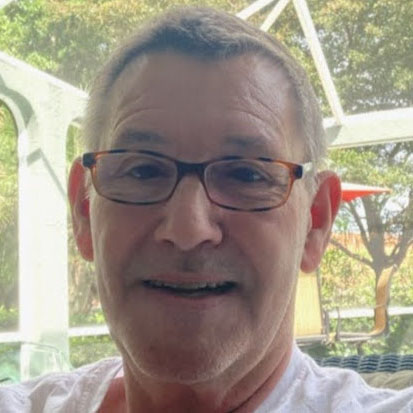
Carl March: Pancreatic Cancer Story
Written By Julia Brabant
July 2022
Diagnosed: 2012
Status: No Sign Of Cancer
From “6 Months to Live” to an Almost 10-Year Survivor
When Carl March’s doctor diagnosed him with pancreatic cancer and told him he had an estimated six months to live, a good friend urged him to get a second opinion. Now, almost 10 years later, he’s grateful he heeded that advice – and sharing his story so others facing their own diagnoses might take similar action.
A resident of Sarasota, Florida, Carl remembers the precise moment his pancreatic cancer story began. He was at a New Year’s Day Brunch ringing in the start of 2013 when a buffet everyone else seemed to love started turning his stomach. From then on, he couldn’t eat or drink a thing, and even cigarettes, something he’d enjoyed at the time, seemed completely unappealing.
He returned to the hospital later for more tests, with doctors inserting a camera to perform an endoscopic ultrasound. This caused an inflammation and pancreatitis, which delivered the first real pain Carl felt since his ordeal began.
At a good friend’s urging, Carl decided to get another medical opinion. The Moffit Cancer Center, located about an hour north of Sarasota, has a world-renowned cancer program, and Carl had a personal relationship with a significant hospital donor. He called in a favor to get an appointment, and he soon drove to Moffit and booked a motel so he could meet with Dr. Mokenge Malaga, M.D. and Tai Hutchinson, N.P.
“I remember saying, ‘I thank you for all of your efforts,’” Carl recalls telling his medical team ahead of the 10-hour surgery. “If it doesn’t work out, I know you tried.”
He was somewhat surprised when he came to, but he had developed an infection during the procedure that delayed his time in the hospital. About three weeks later, he was able to leave, but he had some new hardware – he’d had a port installed before his surgery, because medical staff had struggled to draw his blood.
Because he’d go on to receive chemotherapy after leaving the hospital, doctors left the port in. Eventually, they removed it and began administering chemo directly into his arm.
“This was one of the few things that really hurt me; the chemo in the arm,” Carl said. “It felt like my arm was on fire.”
Doctors made some changes to his regimen, including cutting the chemo with saline. This lengthened the sessions, but cut the pain – a price Carl was willing to pay. He also managed to get himself to and from most of his sessions himself, despite receiving many offers from others willing to drive and accompany him to the hospital.
“I’m sort of independent – I didn’t want people to have to drive me all the way here and then wait five hours,” he said. “I did it myself, and I felt good about that.”
After several months, Carl “rang the bell,” signaling the end of his chemotherapy treatments. Soon after, radiation began, and he completed it without much trouble.
Initially, he went back to Moffitt for follow-up PET scans every three months, following this pattern for two years – or 18 months longer than his original doctor said he’d live. Then, those follow-ups starting taking place every six months, and then every year.
“If people are going to have problems, it usually happens in the first two years,” he said, noting that he credits Dr. Malaga, Nurse Practitioner Hutchinson and the entire Moffitt team with his success. He’d also long dreamed of owning a vacation home in the mountains of North Carolina, and after he cleared the two-year cancer-free mark, he pulled the trigger on the purchase.
Carl is lucky in that his current lifestyle remains pretty similar to the one he had before his diagnosis. He took Creon, or pancreatic enzymes, with every meal, but with each pill costing around $6 and most pancreatic cancer patients relying on the drug for life, the steep price, for many, is not sustainable or ideal. Another pancreatic cancer survivor introduced him to an alternative form of pancreatic enzymes available through Amazon, so he weaned himself off of Creon and made the switch, finding that the alternative worked just as well.
He’s also become a source of information for others facing pancreatic cancer diagnoses, offering insight into the financial ramifications of the disease and the importance of getting a second medical opinion following a serious diagnosis.
Carl March has been cancer-free since the summer of 2016.




Great Story about Carl!! I hope many more heed that advice.